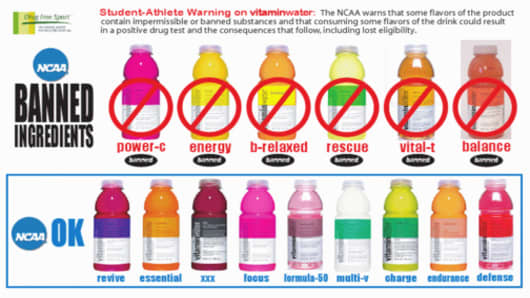The graphic was supposedly generated by an organization called Drug Free Sport in response to the need for an educational campaign so that athletes would be protected against Vitaminwater causing a false positive. Drug Free Sport denied to Ad Age that it ever sent out the graphic to coaches, but it's not hard to figure out how it would have gotten to this point. The evidence is still on the NCAA Web site.
At a meeting in early January, the NCAA assistant director of health and safety noted that "some flavors of the product contain impermissible or banned substances, and that the student-athletes believe that an aggressive educational effort will be necessary."
After days of the story festering in newspapers and on blogs, the NCAA released this statement late yesterday.
"Normal daily consumption of any of the 13 Vitaminwater varieties will not place a student-athlete at risk for testing positive for banned substances. Eight of the varieties, including Revive, the only NCAA-branded variety featured at NCAA Championships, contain no impermissible or banned substances and may be provided by member institutions to student-athletes.
Three Vitaminwater varieties (Power-c, B-relaxed, and Balance) contain ingredients that categorize them as impermissible under NCAA extra benefit rules. As such, schools cannot provide these varieties to student-athletes as a nutritional supplement, but they can be purchased and consumed by student-athletes on their own without any risk to their NCAA eligibility.
Two Vitaminwater varieties, Energy and Rescue, contain an ingredient or ingredients -- caffeine and guarana seed extract (a caffeine source) — that are included on the NCAA's drug-testing list of banned substances. The NCAA places a limit on the amount of caffeine that can be legally found in the urine of a student-athlete. This level was set to allow ordinary consumption of caffeine-containing beverages, such as cola, tea or coffee. Vitaminwater Energy and Vitaminwater Rescue contain low levels of caffeine. To put it in perspective, an average sized healthy man would have to drink ten 20 oz. bottles of Vitaminwater Energy or Rescue within several hours of competition to reach the level that could potentially create a positive NCAA urine test."
The NCAA and Vitaminwater's parent company, Coca-Cola, have diligently researched issues surrounding student-athlete consumption of these products prior to the October 2008 announcement of Revive being featured on sideline equipment at NCAA championships. At no time has student-athlete eligibility been put at risk for those who choose to drink Revive or any of the other varieties under normal daily consumption standards."
Now, let's get to a couple things here -- first of all, the NCAA covering its tracks. The release is entitled, "FOR THE RECORD: NCAA Corrects Inaccurate Media Coverage of the NCAA/Vitaminwater Relationship," but that's not what it was. It was the media's response to one misleading, or at the least very incomplete, piece of information that was put on the NCAA's Web site. And unless you think this graphic obtained by Deadspin was made up, which given the background we'd have little reason to believe, that's another piece of information, whether it was generated by the NCAA or not, that seems to be completely legitimate.
The lesson from this? If you are going to put your notes from a meeting on a Web site, make sure they are complete. They are a matter of public record and there's a greater burden of responsibility these days with everything being searchable. Why wasn't the information about the amount you'd have to drink to test positive discussed at the initial NCAA meeting? And, if there was further information on this topic, shouldn't the NCAA have linked it to page that had amended information?
Secondly, don't you find it funny that the NCAA has a relationship with a brand in which some of the products by that brand can't be provided free to the athletes? We'd love to see a guy like Tim Tebow be declared ineligible for next year's opener because, at some point, the University of Florida provided a couple bottles of "Rescue" to him.
Update: NCAA spokesman Erik Christianson says that I'm wrong here. That the NCAA News was correct in that some flavors (two) could trigger a positive test. Christianson says that the release blaming the media was specifically referring to Ad Age, which said that six of the varieties of the drink could result in a false positive for its athletes. Finally, he says that the chart, posted by Deadspin, was not created or disseminated by the NCAA or Drug Free Sport. I stand by my commentary. The NCAA notes made no reference to a specific amount of flavors. If the NCAA said in its press release that a normal person would have to drink ten 20-ounce bottles within several hours of competition to create a false positive, can you imagine how many drinks some of these athletes would have to drink? I believe this proves it was a non-issue from the start, but it was brought up and documented by the NCAA for no reason and lives on the Web site for all of us to see. As for the poster, we're checking to find out where it comes from.
Questions? Comments? SportsBiz@cnbc.com



